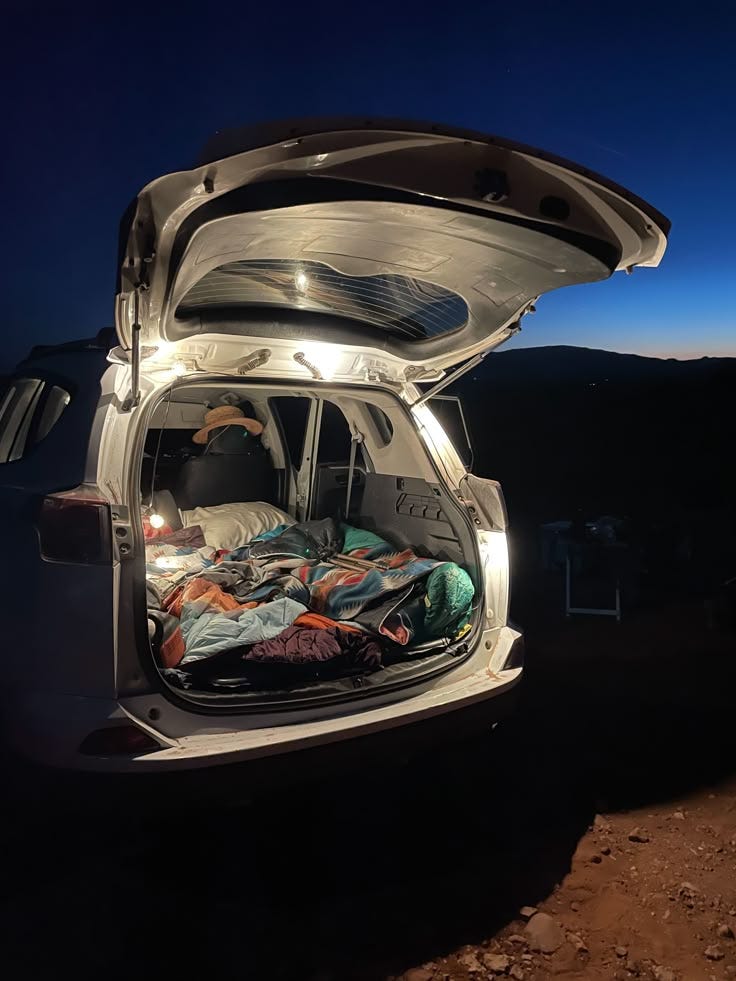By guest author Skilos of Cascade Frontier.
We’re getting into springtime, and that means most of the excuses for skipping a night in the outdoors will soon be inapplicable.
Winter temps get too cold at night for your gear? Not in spring and early summer, when 40°F lows are about as bad as it gets, and proper weather window selection can virtually guarantee something balmier than that.
Summer temps get too hot to sleep? Pick a day before the peak of the year and enjoy the cool evening breeze bringing things back to a reasonable temperature. If geography permits and the weather is stifling, head up. The mountains are always cool at night, and the stars are even clearer when in them.
The car starts, turning over one last time at the gas station before the final leg of the journey. Packed, perhaps overpacked, with gear, it drives without hurry out of town and away from the city lights.
A sleeping bag rolls across the rear seat as the car turns left, off the main highway and onto a forest service road. Within two minutes, the state route is no longer visible. Within ten, it can’t be heard. The road flattens into a high meadow, trees thinning and providing pull-offs for camp. The car stops.
It doesn’t take much equipment for your first night out. If you don’t have a sleeping bag, strip your sheets and grab your pillow. Perhaps throw in some extra blankets in case you struggle to sleep well in the cold. Most don’t.
You’re not looking to do anything big here. No deep-woods adventuring, no mountain summits. Just in and out, campfire highly encouraged but optional. It’s preferable to build it in the evening, with longer days providing more time to enjoy the flames before bedtime comes.
Keep it simple and eat an early, large dinner before you leave. No need to pack for two meals. Make a simple breakfast in advance, some overnight oats in a Mason jar. Or take up a freeze-dried meal like a Mountain House, but it’s nicer to earn those.
Bring water. A gallon should be plenty. Include a way to heat it up; nothing hits the spot like fresh coffee or tea after a night in the cold as the sun rises over the hills and the world begins to wake up. That will be your morning task: create fire, boil water, then break down camp and go home.
The car’s dome light flicks on as the driver’s door opens. Boots crunch pine needles, knees crack as they extend after bending for too long.
Rear seats fold down. The passenger’s seat slides forward, and a camping pad is set up with sleeping bag on top.
The sun dips below the horizon, and the temperature starts dropping. Before too much heat escapes the car, its doors are shut and trunk closed. Two socked feet slide to the end of the sleeping bag, and then there is a brief shuffle as the forgetting of a pillow is discovered and then accepted.
Location selection is important but broad, each locale having its own benefits.
Wide-open plains, salt flats, or desert will lend itself to excellent starry skies, expansive horizons, and that certain eerie calm that only descends when everything but the wind is silent and asleep.
Forests and mountains will be busier, both in the horizon’s view and sonically. Woodland creatures will stay up all night serenading, with chirps and buzzes lulling you to sleep and greeting you in the morning.
Out West, the BLM Land Map can be a great place to start, with thousands of free dispersed campsites and pull-offs dotting the landscape. Further east, those slightly-less-committed Faustians are stuck with fewer options, but a simple search of dispersed or free camping in your state should pull up at least a few options.
Nature’s evening sounds give way to nighttime stillness. The moon, gibbous and almost to full, provides an almost-navigable illumination to the meadow.
A coyote pack begins its hunt in the far distance, yips echoing off of the hills, spilling over each other and terrifying the rabbits in their burrows.
The car’s interior remains cramped but warmed by the body within it. Condensation builds on the windows, moisture exhaled through the night.
In the morning, break down the fledgling camp and head home. If coals remain of the campfire, stoke them and boil some water — a cast iron pan from home (with a lid to avoid ash contamination) will work, but some sort of pot is ideal. Otherwise, gas stoves are cheap and easy to use; sourcing one from a camping gear store or online shouldn’t cost more than $50 or so. Committed backpackers often tend towards options like a Jetboil, their speed and efficiency making up for the lack of flexibility.
If it’s your first time out, though, keep it simple and use the campfire.
The morning brew you produce will be among the worst you ever make, with random grit, ash, sand, and whatever else is floating around to contaminate your process. It won’t be at a precise temperature, and it’s unlikely your favorite home carafe is suitable for the outdoors.
But with the morning cold and the dawn breaking, it will taste better than anything you’ve ever sipped.
Cold breezes blow in down the hills to the east, diffusing into the trees at the edge of the meadow. Temperatures stabilize at nighttime lows.
The moon reaches its apex in the sky, and the diffuse clouds fully clear in the nighttime stillness.
After returning to civilization, the next step is maintaining momentum and sharing the love.
As soon as possible, pick a target date (flex it later if needed) for the next outing; the best way to live a life is monkey-barring from adventure to adventure. You’ll likely have identified at least one piece of gear that seemed useless but is now clearly critical; purchase that and hold off on anything more. Unless you’re beyond flush with cash (in which case you should be donating it to subsidize posts on this Substack instead), gear acquisition is most enjoyable when done slowly and savored.
Recruit a couple of key friends as well; the best adventures and mishaps are those shared with others. It’s not necessary to seek out danger immediately with an untested group, and instead it’s simpler to observe group dynamics as tasks arise. Those capable of handling themselves in truly difficult situations will quickly stand out, and they will be the core for any high-risk action.
Fraternity is best built through small, but still testing, steps, with easy off-ramps for those unable or unwilling to go the full distance.
A mouse scurries out of its burrow, searching for food by the cover of night. A mother owl spots it and silently swoops down, securing a meal for herself and her young.
And above, the stars shine on, undisturbed.











Thanks for hosting my price, gents!
And readers, get out there and enjoy some nature this Friday night.
Better yet. Drive to a remote area and hike to your campsite. Just don’t do it when being underprepared will kill you.